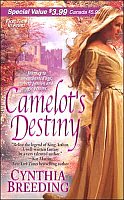|
|
BOOK
ILLUMINATIONS
From Medieval Book Reviews
HOME
ROMANCE
FICTION SUSPENSE & THRILLERS
MYSTERY
AUTHORS REVIEWER
PROFILES
|
Camelot's Destiny

by Cynthia
Breeding

A
magnificent Arthurian romance, faithful to the medieval tradition yet
new in its insights.
Since
most readers already know the Camelot story in one fashion or another
(both a romance and tragedy), in lieu of a plot summary, I will simply
state that Cynthia Breeding's CAMELOT'S
DESTINY is faithful to the literary and historical tradition in
the most minute details and yet her romance adds psychological details
and a carefully recrafting of the details in a new context. Her
fictional imagination adds insights merely hinted in the original
texts. The Grail Quest, only a hint here in CAMELOT'S DESTINY, finally makes
sense within the context of the whole Arthurian story thanks to Cynthia
Breeding. If a medieval enthusiast ever wonders what the modern genre
of medieval historical romance could add to the medieval literary
tradition, CAMELOT'S DESTINY
would be a superb example of the importance of historical romance today
and the effect it might have on renewing an interest in both historical
romance and medieval literature.
Cynthia Breeding incorporates the later literary romance tradition in
the true medieval sense of roman arthurien (which translates as
Arthurian romance), and adds back into the Arthur story the chronicle
tradition and historical and tone of the histories written closer to
the actual events. Even better, Cynthia Breeding adds her own fictional
imagination to the great Arthur story, allowing fans to see the love,
romance, and jealousies that threatened this great king and his realm.
By adding the story of the women, the non-pagan tradition to the
Christian one and the details of the personal lives of the Camelot and
Avalon world, Arthurian lovers see the real tensions and romance
underlying the political world of knights and kings. Cynthia Breeding
expands upon the details of the friendship between Arthur and Lancelot,
as well as their rivalry, which are there but never fully explicated in
the medieval texts. We see Gwenhwyfar as a person and woman beyond her
role as queen and the literary courtly traditions surrounding her. The
author brings together the whole world of Vivien, Nimue and Avalon in a
way that enlightens some of the tensions and loyalties at Camelot. The
psychological portraits of Medraut (known as Mordred in some medieval
tales) and Galahad add true insights into some of the events
surrounding Camelot. For one of the first times, we see maybe a bit of
the psychological reasons behind his madness within that motivates him
to destroy Camelot. Readers will love Galahad here thanks to Cynthia
Breeding. In the Old French grail quest version, Galahad is the perfect
spiritual knight but so grating on the nerves. Here he is also
spiritual but his relationship to his father adds a giving quality to
his Christian calling rather than the sanctimonious preachy perfect
beyond human way the Old French cleric wrote him.
Don't expect an idealized Hollywood version of Camelot here. Although
these versions are fun to read as well, Cynthia Breeding relies on the
actual medieval historical and literary records. Camelot is a world
teetering on the brink of darkness and destruction as the Saxon
invasion nears. Nevertheless, among this darkness and internal pain
within the characters, there is a happy ending that actual feels more
whole and encompassing than a simplistic ending could ever be. Can
those forced to love through duty somehow find a love of the heart?
Here Cynthia Breeding adds that special twist that only modern day
historical romance can give back to the medieval tradition, as hearts
find wholeness. While remaining faithful to the modern romance genre
conventions, Cynthia Breeding still finds a special twist for the
ending to the delight of medieval enthusiasts! Camelot's Destiny is a welcome
addition to the Arthurian canon, one that tells the story of tension
and love at Camelot from the point of view of not just king, knights
and queen but of men and women.
Publisher: Zebra (August 2006)
Reviewed by Merrimon,
Medieval Book Reviews

|
|
|